Relationship: Foreign Expansion and Market Sustainability of Tesco
VerifiedAdded on 2022/09/23
|16
|3352
|30
Project
AI Summary
This project investigates the relationship between foreign expansion and market sustainability, focusing on frozen food companies, particularly Tesco Plc. The research explores the benefits, such as increased revenue, higher capital generation, and risk diversification, that foreign expansion offers. It also addresses the challenges, including high initial investment costs and increased dependence on host markets. The study employs a literature review, theoretical framework, and research methodology to analyze Tesco's foreign expansion strategy, examining its impact on financial performance and market position. The findings highlight the importance of strategic foreign expansion for long-term market sustainability, while also acknowledging the need to mitigate associated risks. The research concludes by emphasizing the need for frozen food marketing companies to carefully weigh the benefits and challenges before embarking on foreign expansion.
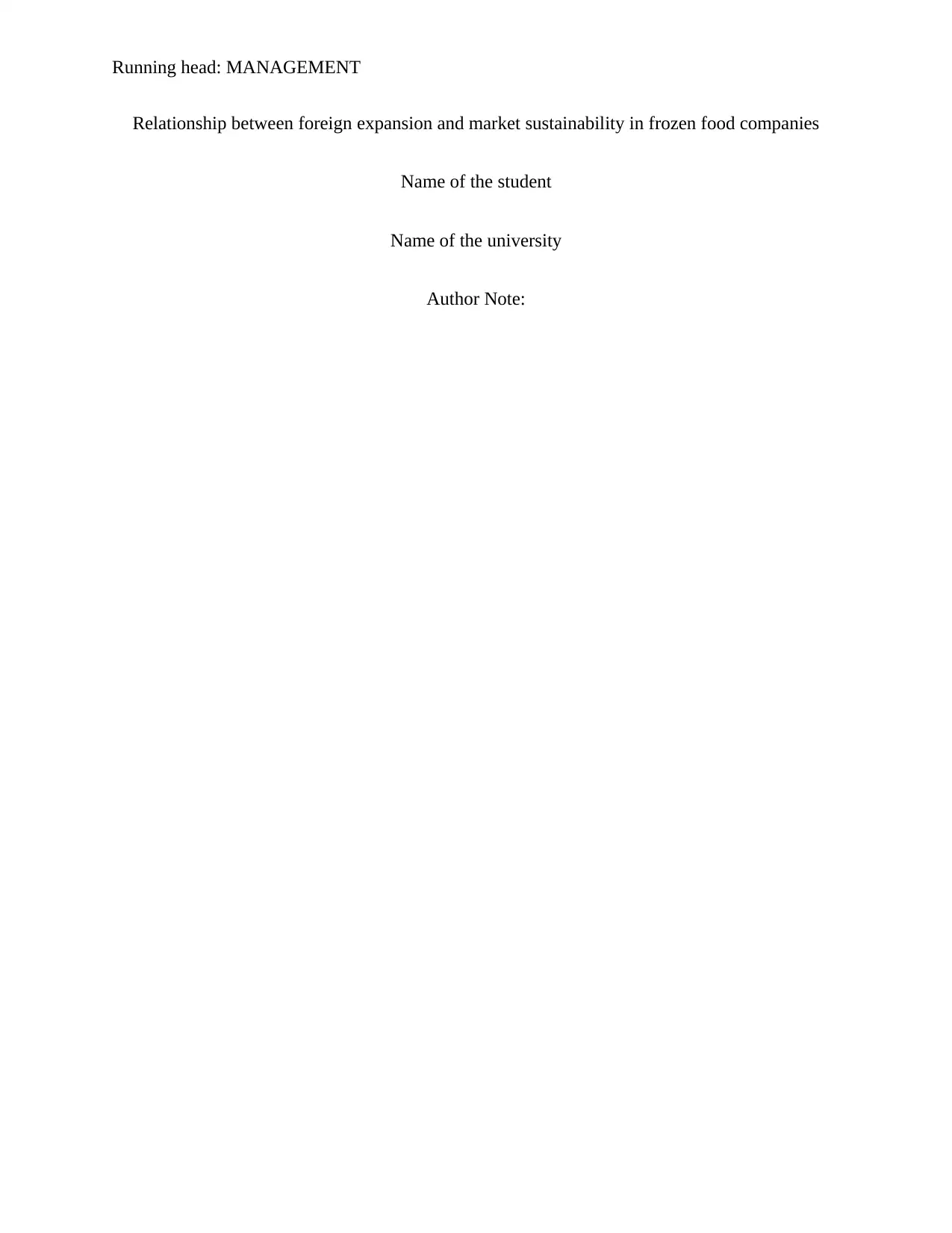
Running head: MANAGEMENT
Relationship between foreign expansion and market sustainability in frozen food companies
Name of the student
Name of the university
Author Note:
Relationship between foreign expansion and market sustainability in frozen food companies
Name of the student
Name of the university
Author Note:
Paraphrase This Document
Need a fresh take? Get an instant paraphrase of this document with our AI Paraphraser
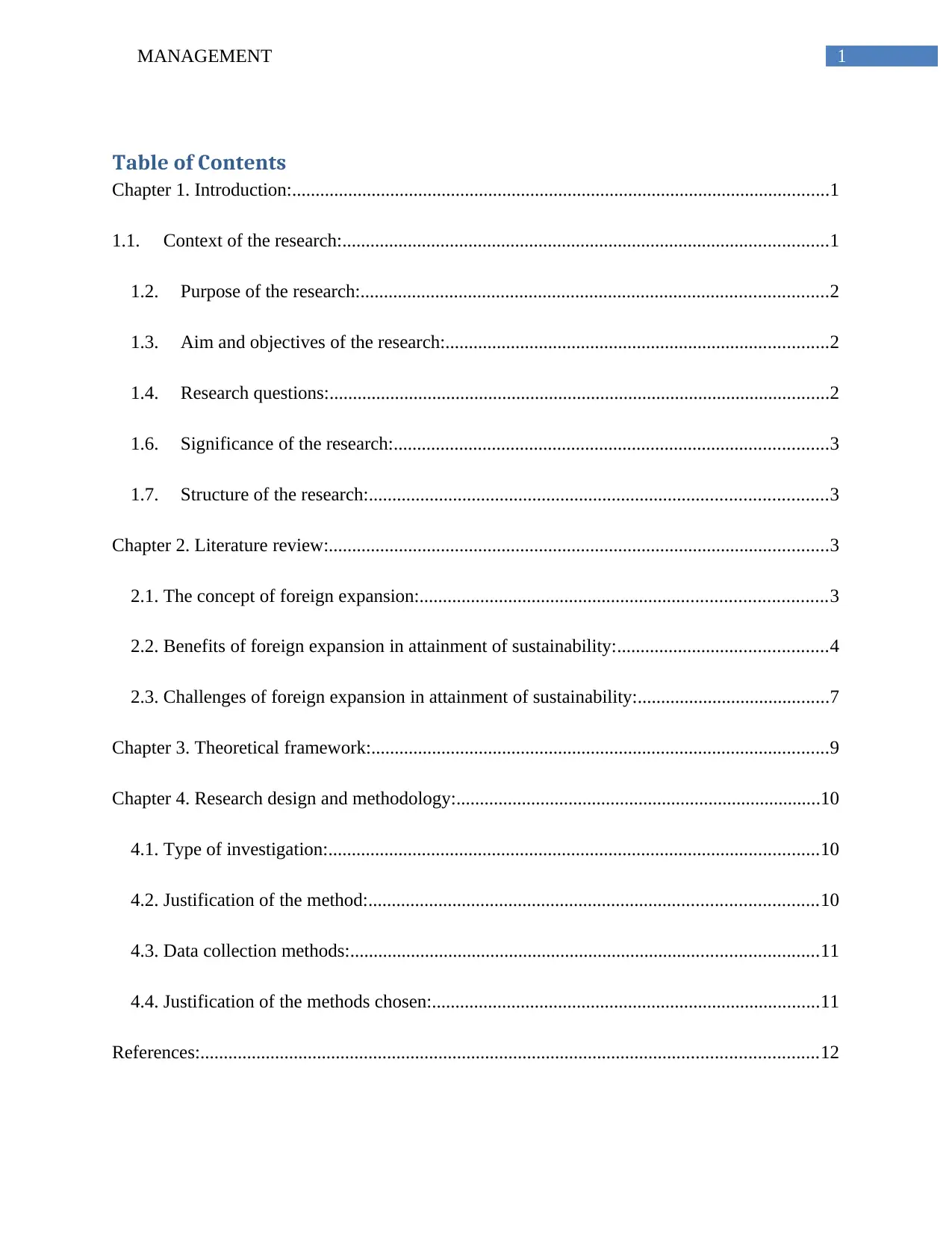
1MANAGEMENT
Table of Contents
Chapter 1. Introduction:...................................................................................................................1
1.1. Context of the research:........................................................................................................1
1.2. Purpose of the research:....................................................................................................2
1.3. Aim and objectives of the research:..................................................................................2
1.4. Research questions:...........................................................................................................2
1.6. Significance of the research:.............................................................................................3
1.7. Structure of the research:..................................................................................................3
Chapter 2. Literature review:...........................................................................................................3
2.1. The concept of foreign expansion:.......................................................................................3
2.2. Benefits of foreign expansion in attainment of sustainability:.............................................4
2.3. Challenges of foreign expansion in attainment of sustainability:.........................................7
Chapter 3. Theoretical framework:..................................................................................................9
Chapter 4. Research design and methodology:..............................................................................10
4.1. Type of investigation:.........................................................................................................10
4.2. Justification of the method:................................................................................................10
4.3. Data collection methods:....................................................................................................11
4.4. Justification of the methods chosen:...................................................................................11
References:....................................................................................................................................12
Table of Contents
Chapter 1. Introduction:...................................................................................................................1
1.1. Context of the research:........................................................................................................1
1.2. Purpose of the research:....................................................................................................2
1.3. Aim and objectives of the research:..................................................................................2
1.4. Research questions:...........................................................................................................2
1.6. Significance of the research:.............................................................................................3
1.7. Structure of the research:..................................................................................................3
Chapter 2. Literature review:...........................................................................................................3
2.1. The concept of foreign expansion:.......................................................................................3
2.2. Benefits of foreign expansion in attainment of sustainability:.............................................4
2.3. Challenges of foreign expansion in attainment of sustainability:.........................................7
Chapter 3. Theoretical framework:..................................................................................................9
Chapter 4. Research design and methodology:..............................................................................10
4.1. Type of investigation:.........................................................................................................10
4.2. Justification of the method:................................................................................................10
4.3. Data collection methods:....................................................................................................11
4.4. Justification of the methods chosen:...................................................................................11
References:....................................................................................................................................12
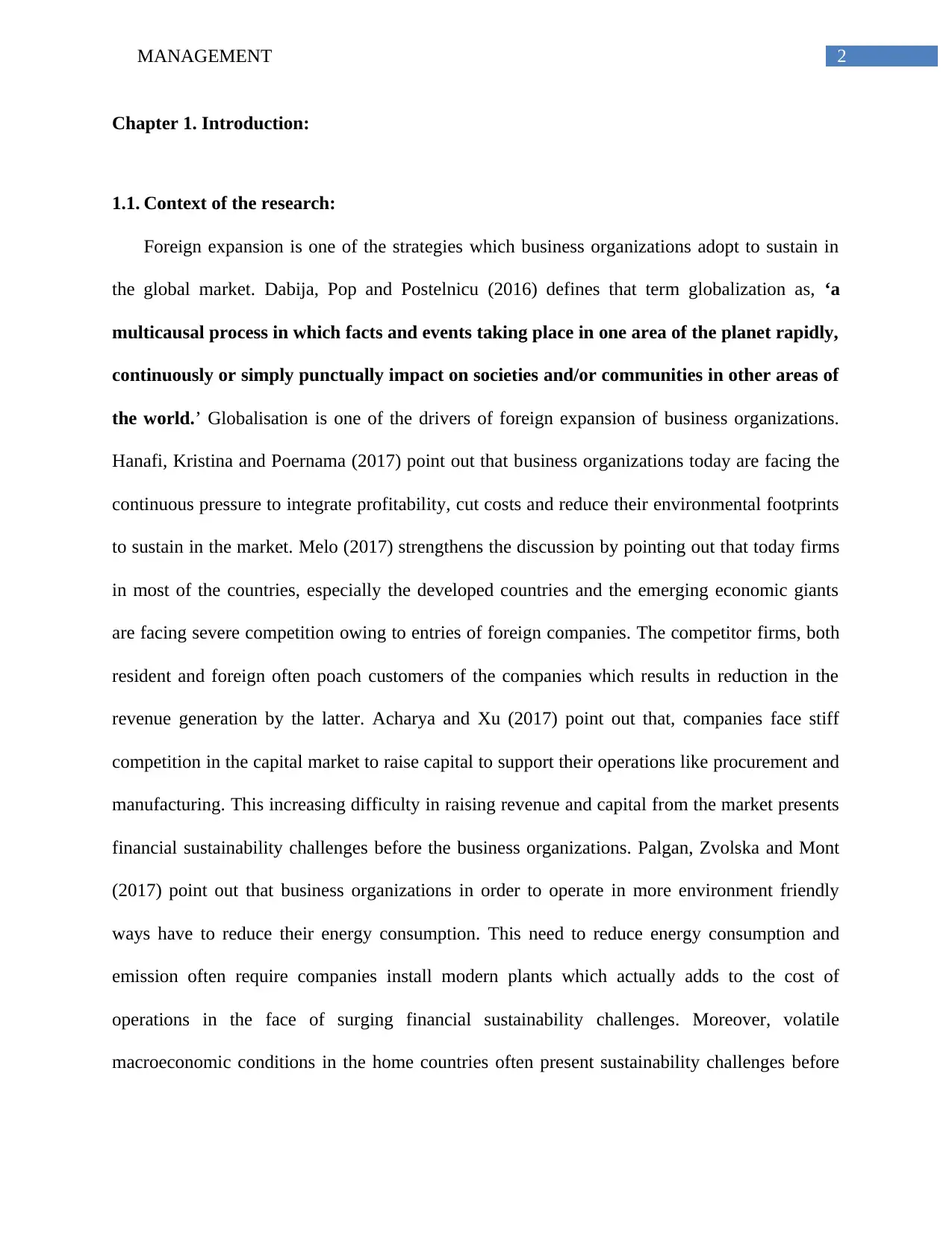
2MANAGEMENT
Chapter 1. Introduction:
1.1. Context of the research:
Foreign expansion is one of the strategies which business organizations adopt to sustain in
the global market. Dabija, Pop and Postelnicu (2016) defines that term globalization as, ‘a
multicausal process in which facts and events taking place in one area of the planet rapidly,
continuously or simply punctually impact on societies and/or communities in other areas of
the world.’ Globalisation is one of the drivers of foreign expansion of business organizations.
Hanafi, Kristina and Poernama (2017) point out that business organizations today are facing the
continuous pressure to integrate profitability, cut costs and reduce their environmental footprints
to sustain in the market. Melo (2017) strengthens the discussion by pointing out that today firms
in most of the countries, especially the developed countries and the emerging economic giants
are facing severe competition owing to entries of foreign companies. The competitor firms, both
resident and foreign often poach customers of the companies which results in reduction in the
revenue generation by the latter. Acharya and Xu (2017) point out that, companies face stiff
competition in the capital market to raise capital to support their operations like procurement and
manufacturing. This increasing difficulty in raising revenue and capital from the market presents
financial sustainability challenges before the business organizations. Palgan, Zvolska and Mont
(2017) point out that business organizations in order to operate in more environment friendly
ways have to reduce their energy consumption. This need to reduce energy consumption and
emission often require companies install modern plants which actually adds to the cost of
operations in the face of surging financial sustainability challenges. Moreover, volatile
macroeconomic conditions in the home countries often present sustainability challenges before
Chapter 1. Introduction:
1.1. Context of the research:
Foreign expansion is one of the strategies which business organizations adopt to sustain in
the global market. Dabija, Pop and Postelnicu (2016) defines that term globalization as, ‘a
multicausal process in which facts and events taking place in one area of the planet rapidly,
continuously or simply punctually impact on societies and/or communities in other areas of
the world.’ Globalisation is one of the drivers of foreign expansion of business organizations.
Hanafi, Kristina and Poernama (2017) point out that business organizations today are facing the
continuous pressure to integrate profitability, cut costs and reduce their environmental footprints
to sustain in the market. Melo (2017) strengthens the discussion by pointing out that today firms
in most of the countries, especially the developed countries and the emerging economic giants
are facing severe competition owing to entries of foreign companies. The competitor firms, both
resident and foreign often poach customers of the companies which results in reduction in the
revenue generation by the latter. Acharya and Xu (2017) point out that, companies face stiff
competition in the capital market to raise capital to support their operations like procurement and
manufacturing. This increasing difficulty in raising revenue and capital from the market presents
financial sustainability challenges before the business organizations. Palgan, Zvolska and Mont
(2017) point out that business organizations in order to operate in more environment friendly
ways have to reduce their energy consumption. This need to reduce energy consumption and
emission often require companies install modern plants which actually adds to the cost of
operations in the face of surging financial sustainability challenges. Moreover, volatile
macroeconomic conditions in the home countries often present sustainability challenges before
⊘ This is a preview!⊘
Do you want full access?
Subscribe today to unlock all pages.

Trusted by 1+ million students worldwide
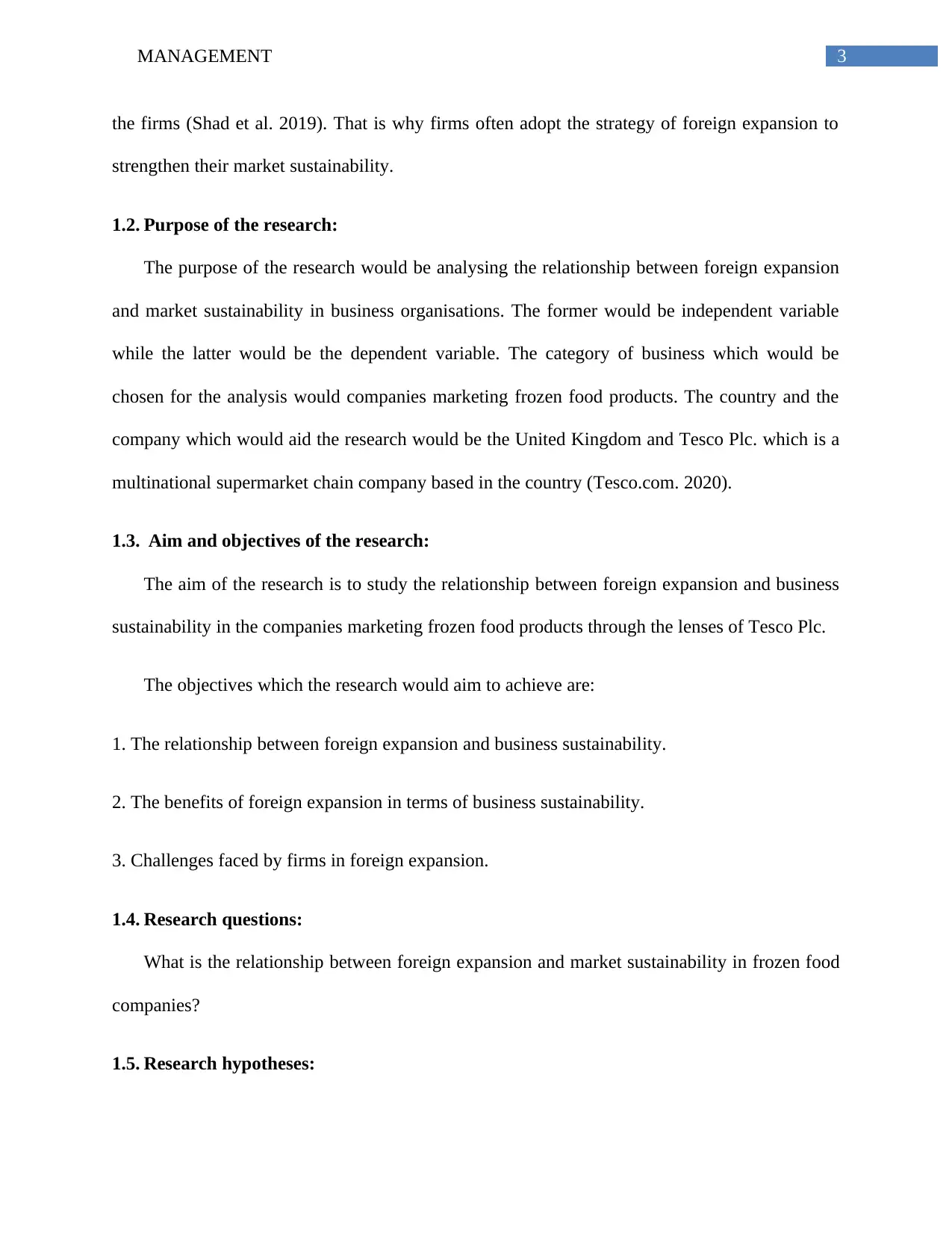
3MANAGEMENT
the firms (Shad et al. 2019). That is why firms often adopt the strategy of foreign expansion to
strengthen their market sustainability.
1.2. Purpose of the research:
The purpose of the research would be analysing the relationship between foreign expansion
and market sustainability in business organisations. The former would be independent variable
while the latter would be the dependent variable. The category of business which would be
chosen for the analysis would companies marketing frozen food products. The country and the
company which would aid the research would be the United Kingdom and Tesco Plc. which is a
multinational supermarket chain company based in the country (Tesco.com. 2020).
1.3. Aim and objectives of the research:
The aim of the research is to study the relationship between foreign expansion and business
sustainability in the companies marketing frozen food products through the lenses of Tesco Plc.
The objectives which the research would aim to achieve are:
1. The relationship between foreign expansion and business sustainability.
2. The benefits of foreign expansion in terms of business sustainability.
3. Challenges faced by firms in foreign expansion.
1.4. Research questions:
What is the relationship between foreign expansion and market sustainability in frozen food
companies?
1.5. Research hypotheses:
the firms (Shad et al. 2019). That is why firms often adopt the strategy of foreign expansion to
strengthen their market sustainability.
1.2. Purpose of the research:
The purpose of the research would be analysing the relationship between foreign expansion
and market sustainability in business organisations. The former would be independent variable
while the latter would be the dependent variable. The category of business which would be
chosen for the analysis would companies marketing frozen food products. The country and the
company which would aid the research would be the United Kingdom and Tesco Plc. which is a
multinational supermarket chain company based in the country (Tesco.com. 2020).
1.3. Aim and objectives of the research:
The aim of the research is to study the relationship between foreign expansion and business
sustainability in the companies marketing frozen food products through the lenses of Tesco Plc.
The objectives which the research would aim to achieve are:
1. The relationship between foreign expansion and business sustainability.
2. The benefits of foreign expansion in terms of business sustainability.
3. Challenges faced by firms in foreign expansion.
1.4. Research questions:
What is the relationship between foreign expansion and market sustainability in frozen food
companies?
1.5. Research hypotheses:
Paraphrase This Document
Need a fresh take? Get an instant paraphrase of this document with our AI Paraphraser
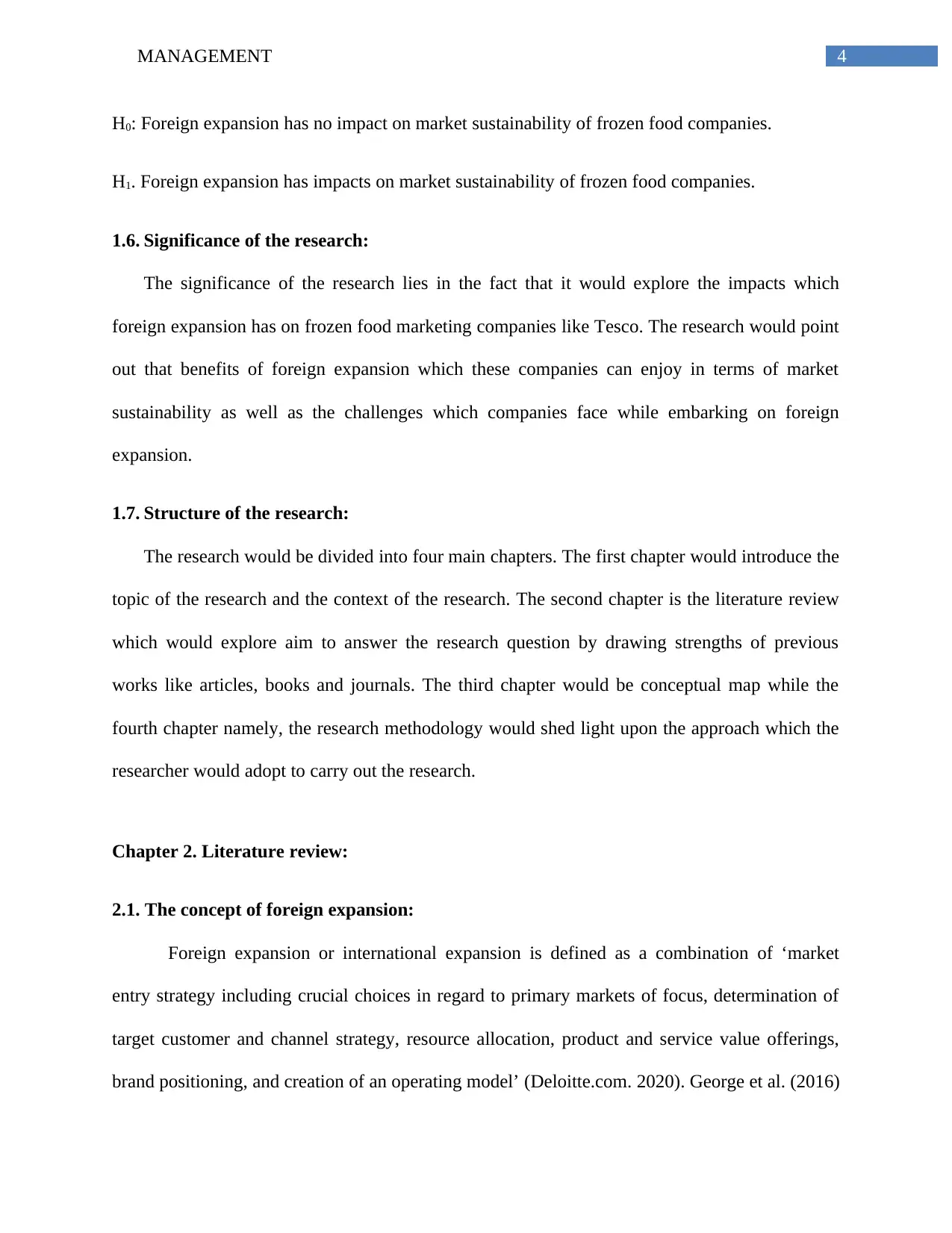
4MANAGEMENT
H0: Foreign expansion has no impact on market sustainability of frozen food companies.
H1. Foreign expansion has impacts on market sustainability of frozen food companies.
1.6. Significance of the research:
The significance of the research lies in the fact that it would explore the impacts which
foreign expansion has on frozen food marketing companies like Tesco. The research would point
out that benefits of foreign expansion which these companies can enjoy in terms of market
sustainability as well as the challenges which companies face while embarking on foreign
expansion.
1.7. Structure of the research:
The research would be divided into four main chapters. The first chapter would introduce the
topic of the research and the context of the research. The second chapter is the literature review
which would explore aim to answer the research question by drawing strengths of previous
works like articles, books and journals. The third chapter would be conceptual map while the
fourth chapter namely, the research methodology would shed light upon the approach which the
researcher would adopt to carry out the research.
Chapter 2. Literature review:
2.1. The concept of foreign expansion:
Foreign expansion or international expansion is defined as a combination of ‘market
entry strategy including crucial choices in regard to primary markets of focus, determination of
target customer and channel strategy, resource allocation, product and service value offerings,
brand positioning, and creation of an operating model’ (Deloitte.com. 2020). George et al. (2016)
H0: Foreign expansion has no impact on market sustainability of frozen food companies.
H1. Foreign expansion has impacts on market sustainability of frozen food companies.
1.6. Significance of the research:
The significance of the research lies in the fact that it would explore the impacts which
foreign expansion has on frozen food marketing companies like Tesco. The research would point
out that benefits of foreign expansion which these companies can enjoy in terms of market
sustainability as well as the challenges which companies face while embarking on foreign
expansion.
1.7. Structure of the research:
The research would be divided into four main chapters. The first chapter would introduce the
topic of the research and the context of the research. The second chapter is the literature review
which would explore aim to answer the research question by drawing strengths of previous
works like articles, books and journals. The third chapter would be conceptual map while the
fourth chapter namely, the research methodology would shed light upon the approach which the
researcher would adopt to carry out the research.
Chapter 2. Literature review:
2.1. The concept of foreign expansion:
Foreign expansion or international expansion is defined as a combination of ‘market
entry strategy including crucial choices in regard to primary markets of focus, determination of
target customer and channel strategy, resource allocation, product and service value offerings,
brand positioning, and creation of an operating model’ (Deloitte.com. 2020). George et al. (2016)
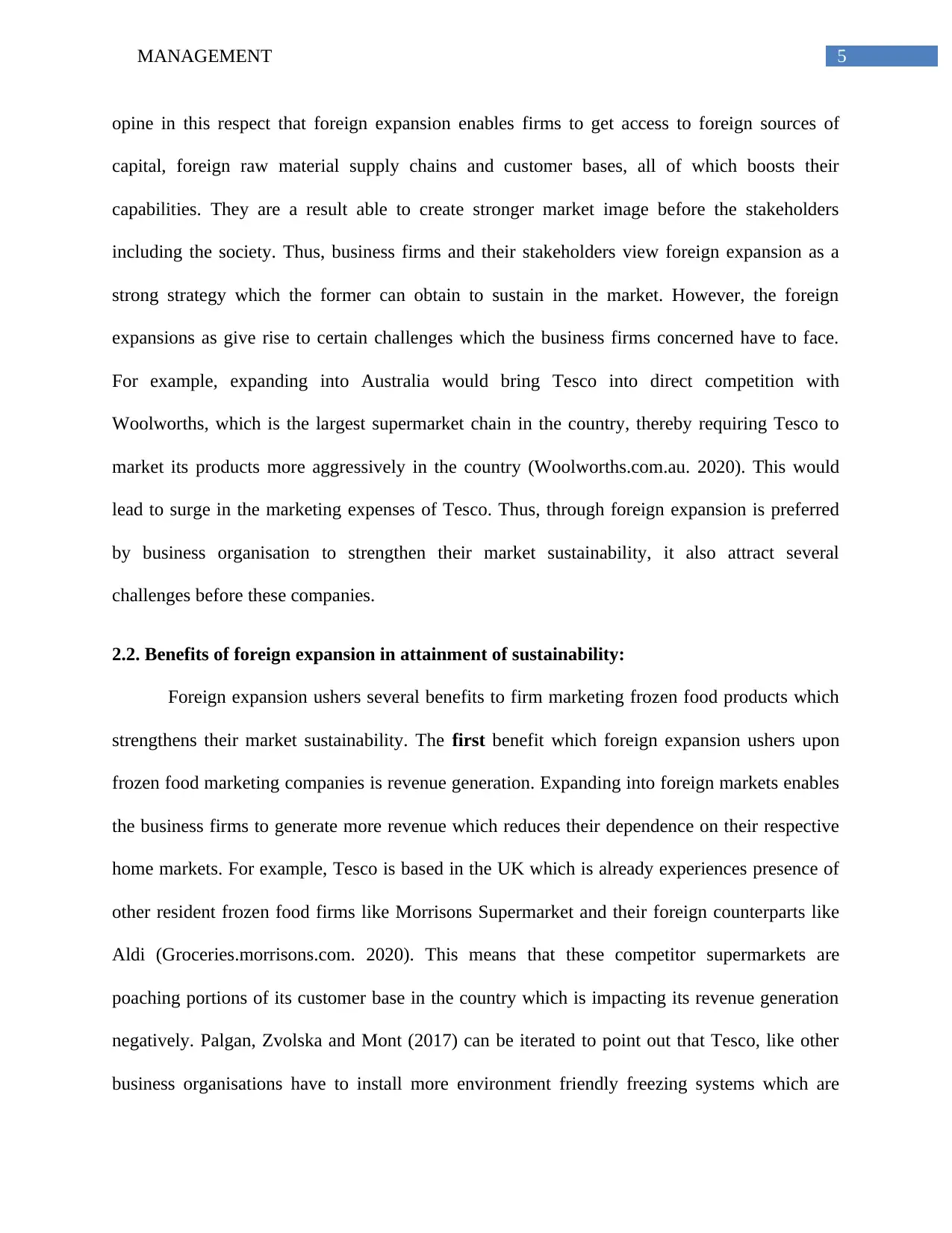
5MANAGEMENT
opine in this respect that foreign expansion enables firms to get access to foreign sources of
capital, foreign raw material supply chains and customer bases, all of which boosts their
capabilities. They are a result able to create stronger market image before the stakeholders
including the society. Thus, business firms and their stakeholders view foreign expansion as a
strong strategy which the former can obtain to sustain in the market. However, the foreign
expansions as give rise to certain challenges which the business firms concerned have to face.
For example, expanding into Australia would bring Tesco into direct competition with
Woolworths, which is the largest supermarket chain in the country, thereby requiring Tesco to
market its products more aggressively in the country (Woolworths.com.au. 2020). This would
lead to surge in the marketing expenses of Tesco. Thus, through foreign expansion is preferred
by business organisation to strengthen their market sustainability, it also attract several
challenges before these companies.
2.2. Benefits of foreign expansion in attainment of sustainability:
Foreign expansion ushers several benefits to firm marketing frozen food products which
strengthens their market sustainability. The first benefit which foreign expansion ushers upon
frozen food marketing companies is revenue generation. Expanding into foreign markets enables
the business firms to generate more revenue which reduces their dependence on their respective
home markets. For example, Tesco is based in the UK which is already experiences presence of
other resident frozen food firms like Morrisons Supermarket and their foreign counterparts like
Aldi (Groceries.morrisons.com. 2020). This means that these competitor supermarkets are
poaching portions of its customer base in the country which is impacting its revenue generation
negatively. Palgan, Zvolska and Mont (2017) can be iterated to point out that Tesco, like other
business organisations have to install more environment friendly freezing systems which are
opine in this respect that foreign expansion enables firms to get access to foreign sources of
capital, foreign raw material supply chains and customer bases, all of which boosts their
capabilities. They are a result able to create stronger market image before the stakeholders
including the society. Thus, business firms and their stakeholders view foreign expansion as a
strong strategy which the former can obtain to sustain in the market. However, the foreign
expansions as give rise to certain challenges which the business firms concerned have to face.
For example, expanding into Australia would bring Tesco into direct competition with
Woolworths, which is the largest supermarket chain in the country, thereby requiring Tesco to
market its products more aggressively in the country (Woolworths.com.au. 2020). This would
lead to surge in the marketing expenses of Tesco. Thus, through foreign expansion is preferred
by business organisation to strengthen their market sustainability, it also attract several
challenges before these companies.
2.2. Benefits of foreign expansion in attainment of sustainability:
Foreign expansion ushers several benefits to firm marketing frozen food products which
strengthens their market sustainability. The first benefit which foreign expansion ushers upon
frozen food marketing companies is revenue generation. Expanding into foreign markets enables
the business firms to generate more revenue which reduces their dependence on their respective
home markets. For example, Tesco is based in the UK which is already experiences presence of
other resident frozen food firms like Morrisons Supermarket and their foreign counterparts like
Aldi (Groceries.morrisons.com. 2020). This means that these competitor supermarkets are
poaching portions of its customer base in the country which is impacting its revenue generation
negatively. Palgan, Zvolska and Mont (2017) can be iterated to point out that Tesco, like other
business organisations have to install more environment friendly freezing systems which are
⊘ This is a preview!⊘
Do you want full access?
Subscribe today to unlock all pages.

Trusted by 1+ million students worldwide
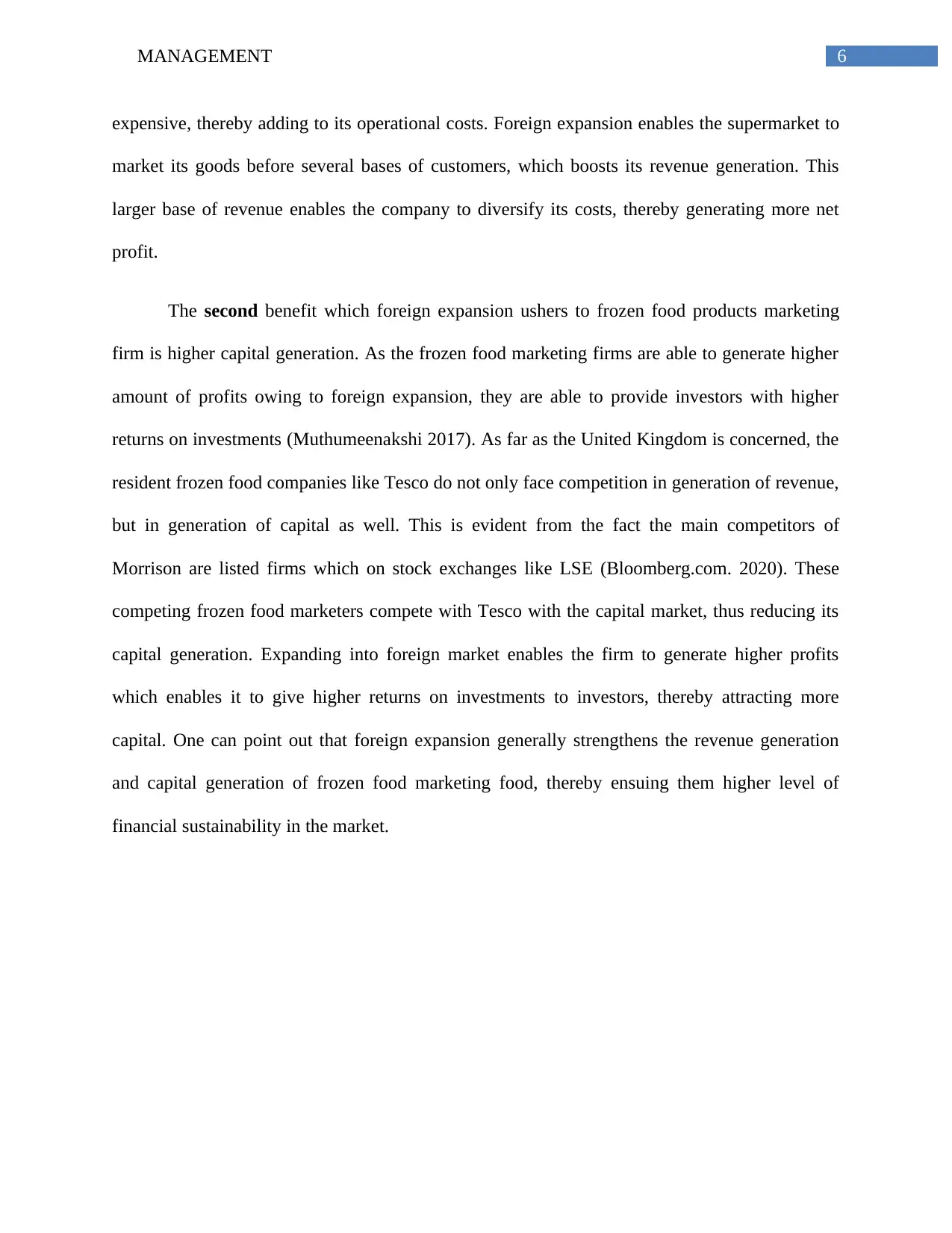
6MANAGEMENT
expensive, thereby adding to its operational costs. Foreign expansion enables the supermarket to
market its goods before several bases of customers, which boosts its revenue generation. This
larger base of revenue enables the company to diversify its costs, thereby generating more net
profit.
The second benefit which foreign expansion ushers to frozen food products marketing
firm is higher capital generation. As the frozen food marketing firms are able to generate higher
amount of profits owing to foreign expansion, they are able to provide investors with higher
returns on investments (Muthumeenakshi 2017). As far as the United Kingdom is concerned, the
resident frozen food companies like Tesco do not only face competition in generation of revenue,
but in generation of capital as well. This is evident from the fact the main competitors of
Morrison are listed firms which on stock exchanges like LSE (Bloomberg.com. 2020). These
competing frozen food marketers compete with Tesco with the capital market, thus reducing its
capital generation. Expanding into foreign market enables the firm to generate higher profits
which enables it to give higher returns on investments to investors, thereby attracting more
capital. One can point out that foreign expansion generally strengthens the revenue generation
and capital generation of frozen food marketing food, thereby ensuing them higher level of
financial sustainability in the market.
expensive, thereby adding to its operational costs. Foreign expansion enables the supermarket to
market its goods before several bases of customers, which boosts its revenue generation. This
larger base of revenue enables the company to diversify its costs, thereby generating more net
profit.
The second benefit which foreign expansion ushers to frozen food products marketing
firm is higher capital generation. As the frozen food marketing firms are able to generate higher
amount of profits owing to foreign expansion, they are able to provide investors with higher
returns on investments (Muthumeenakshi 2017). As far as the United Kingdom is concerned, the
resident frozen food companies like Tesco do not only face competition in generation of revenue,
but in generation of capital as well. This is evident from the fact the main competitors of
Morrison are listed firms which on stock exchanges like LSE (Bloomberg.com. 2020). These
competing frozen food marketers compete with Tesco with the capital market, thus reducing its
capital generation. Expanding into foreign market enables the firm to generate higher profits
which enables it to give higher returns on investments to investors, thereby attracting more
capital. One can point out that foreign expansion generally strengthens the revenue generation
and capital generation of frozen food marketing food, thereby ensuing them higher level of
financial sustainability in the market.
Paraphrase This Document
Need a fresh take? Get an instant paraphrase of this document with our AI Paraphraser
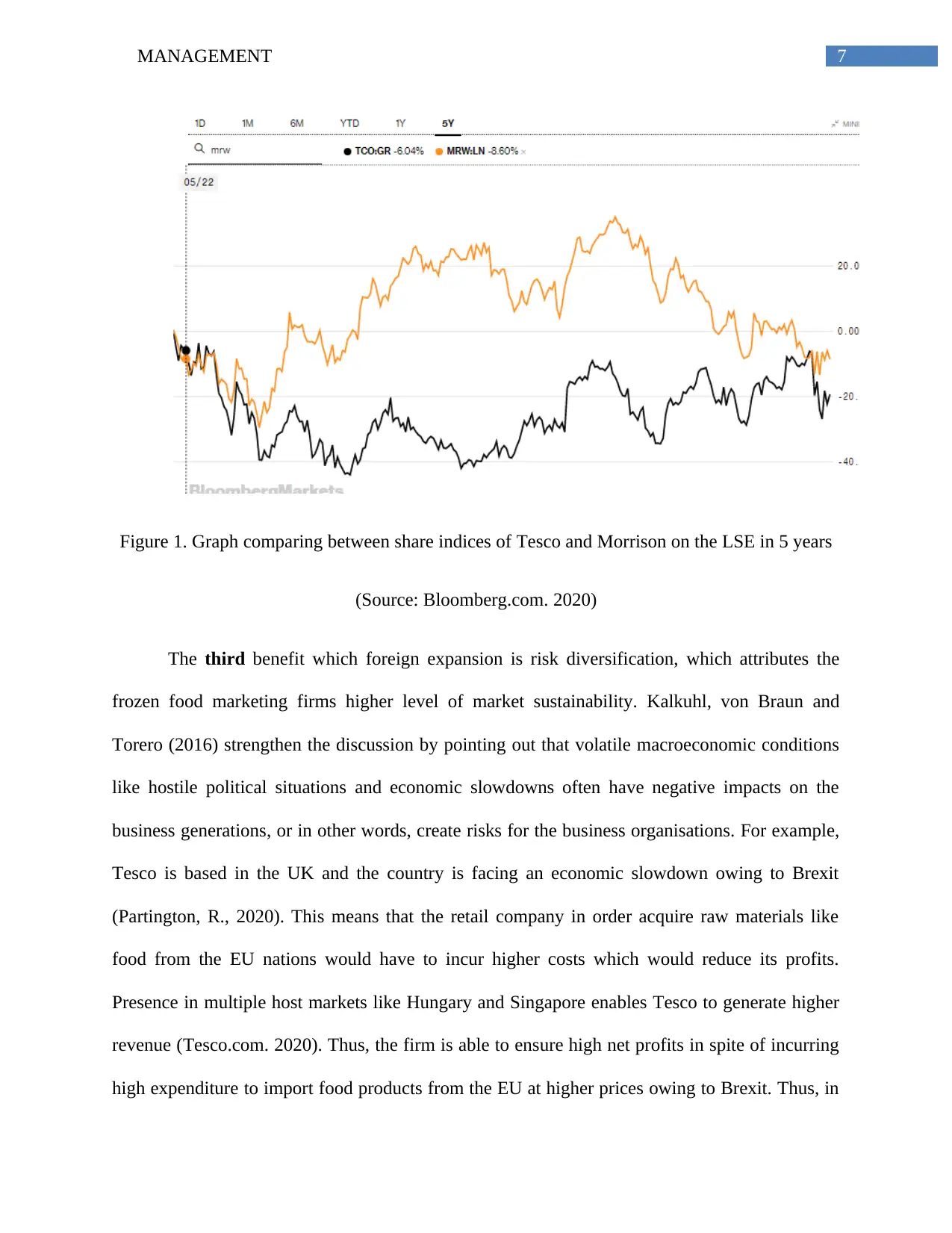
7MANAGEMENT
Figure 1. Graph comparing between share indices of Tesco and Morrison on the LSE in 5 years
(Source: Bloomberg.com. 2020)
The third benefit which foreign expansion is risk diversification, which attributes the
frozen food marketing firms higher level of market sustainability. Kalkuhl, von Braun and
Torero (2016) strengthen the discussion by pointing out that volatile macroeconomic conditions
like hostile political situations and economic slowdowns often have negative impacts on the
business generations, or in other words, create risks for the business organisations. For example,
Tesco is based in the UK and the country is facing an economic slowdown owing to Brexit
(Partington, R., 2020). This means that the retail company in order acquire raw materials like
food from the EU nations would have to incur higher costs which would reduce its profits.
Presence in multiple host markets like Hungary and Singapore enables Tesco to generate higher
revenue (Tesco.com. 2020). Thus, the firm is able to ensure high net profits in spite of incurring
high expenditure to import food products from the EU at higher prices owing to Brexit. Thus, in
Figure 1. Graph comparing between share indices of Tesco and Morrison on the LSE in 5 years
(Source: Bloomberg.com. 2020)
The third benefit which foreign expansion is risk diversification, which attributes the
frozen food marketing firms higher level of market sustainability. Kalkuhl, von Braun and
Torero (2016) strengthen the discussion by pointing out that volatile macroeconomic conditions
like hostile political situations and economic slowdowns often have negative impacts on the
business generations, or in other words, create risks for the business organisations. For example,
Tesco is based in the UK and the country is facing an economic slowdown owing to Brexit
(Partington, R., 2020). This means that the retail company in order acquire raw materials like
food from the EU nations would have to incur higher costs which would reduce its profits.
Presence in multiple host markets like Hungary and Singapore enables Tesco to generate higher
revenue (Tesco.com. 2020). Thus, the firm is able to ensure high net profits in spite of incurring
high expenditure to import food products from the EU at higher prices owing to Brexit. Thus, in
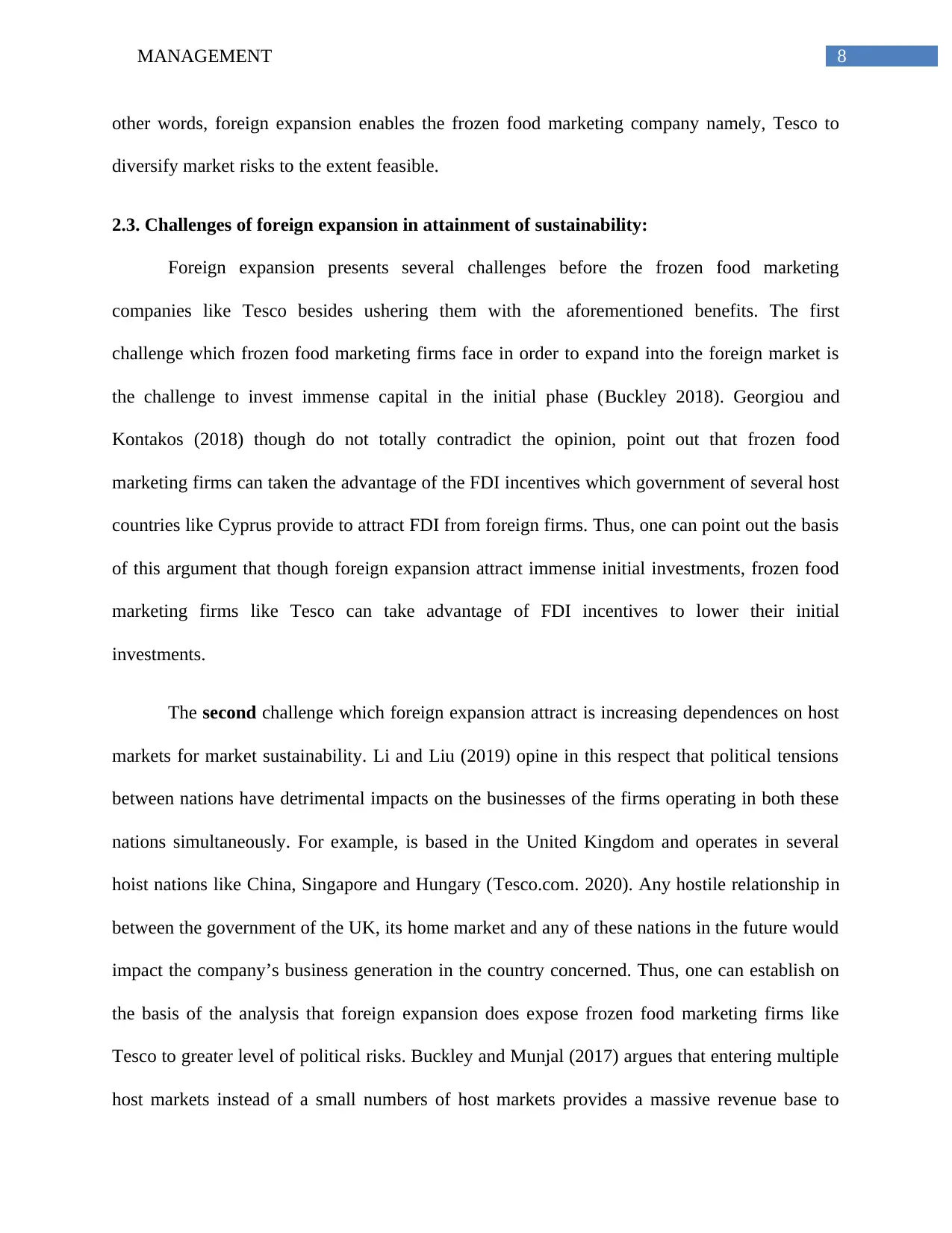
8MANAGEMENT
other words, foreign expansion enables the frozen food marketing company namely, Tesco to
diversify market risks to the extent feasible.
2.3. Challenges of foreign expansion in attainment of sustainability:
Foreign expansion presents several challenges before the frozen food marketing
companies like Tesco besides ushering them with the aforementioned benefits. The first
challenge which frozen food marketing firms face in order to expand into the foreign market is
the challenge to invest immense capital in the initial phase (Buckley 2018). Georgiou and
Kontakos (2018) though do not totally contradict the opinion, point out that frozen food
marketing firms can taken the advantage of the FDI incentives which government of several host
countries like Cyprus provide to attract FDI from foreign firms. Thus, one can point out the basis
of this argument that though foreign expansion attract immense initial investments, frozen food
marketing firms like Tesco can take advantage of FDI incentives to lower their initial
investments.
The second challenge which foreign expansion attract is increasing dependences on host
markets for market sustainability. Li and Liu (2019) opine in this respect that political tensions
between nations have detrimental impacts on the businesses of the firms operating in both these
nations simultaneously. For example, is based in the United Kingdom and operates in several
hoist nations like China, Singapore and Hungary (Tesco.com. 2020). Any hostile relationship in
between the government of the UK, its home market and any of these nations in the future would
impact the company’s business generation in the country concerned. Thus, one can establish on
the basis of the analysis that foreign expansion does expose frozen food marketing firms like
Tesco to greater level of political risks. Buckley and Munjal (2017) argues that entering multiple
host markets instead of a small numbers of host markets provides a massive revenue base to
other words, foreign expansion enables the frozen food marketing company namely, Tesco to
diversify market risks to the extent feasible.
2.3. Challenges of foreign expansion in attainment of sustainability:
Foreign expansion presents several challenges before the frozen food marketing
companies like Tesco besides ushering them with the aforementioned benefits. The first
challenge which frozen food marketing firms face in order to expand into the foreign market is
the challenge to invest immense capital in the initial phase (Buckley 2018). Georgiou and
Kontakos (2018) though do not totally contradict the opinion, point out that frozen food
marketing firms can taken the advantage of the FDI incentives which government of several host
countries like Cyprus provide to attract FDI from foreign firms. Thus, one can point out the basis
of this argument that though foreign expansion attract immense initial investments, frozen food
marketing firms like Tesco can take advantage of FDI incentives to lower their initial
investments.
The second challenge which foreign expansion attract is increasing dependences on host
markets for market sustainability. Li and Liu (2019) opine in this respect that political tensions
between nations have detrimental impacts on the businesses of the firms operating in both these
nations simultaneously. For example, is based in the United Kingdom and operates in several
hoist nations like China, Singapore and Hungary (Tesco.com. 2020). Any hostile relationship in
between the government of the UK, its home market and any of these nations in the future would
impact the company’s business generation in the country concerned. Thus, one can establish on
the basis of the analysis that foreign expansion does expose frozen food marketing firms like
Tesco to greater level of political risks. Buckley and Munjal (2017) argues that entering multiple
host markets instead of a small numbers of host markets provides a massive revenue base to
⊘ This is a preview!⊘
Do you want full access?
Subscribe today to unlock all pages.

Trusted by 1+ million students worldwide
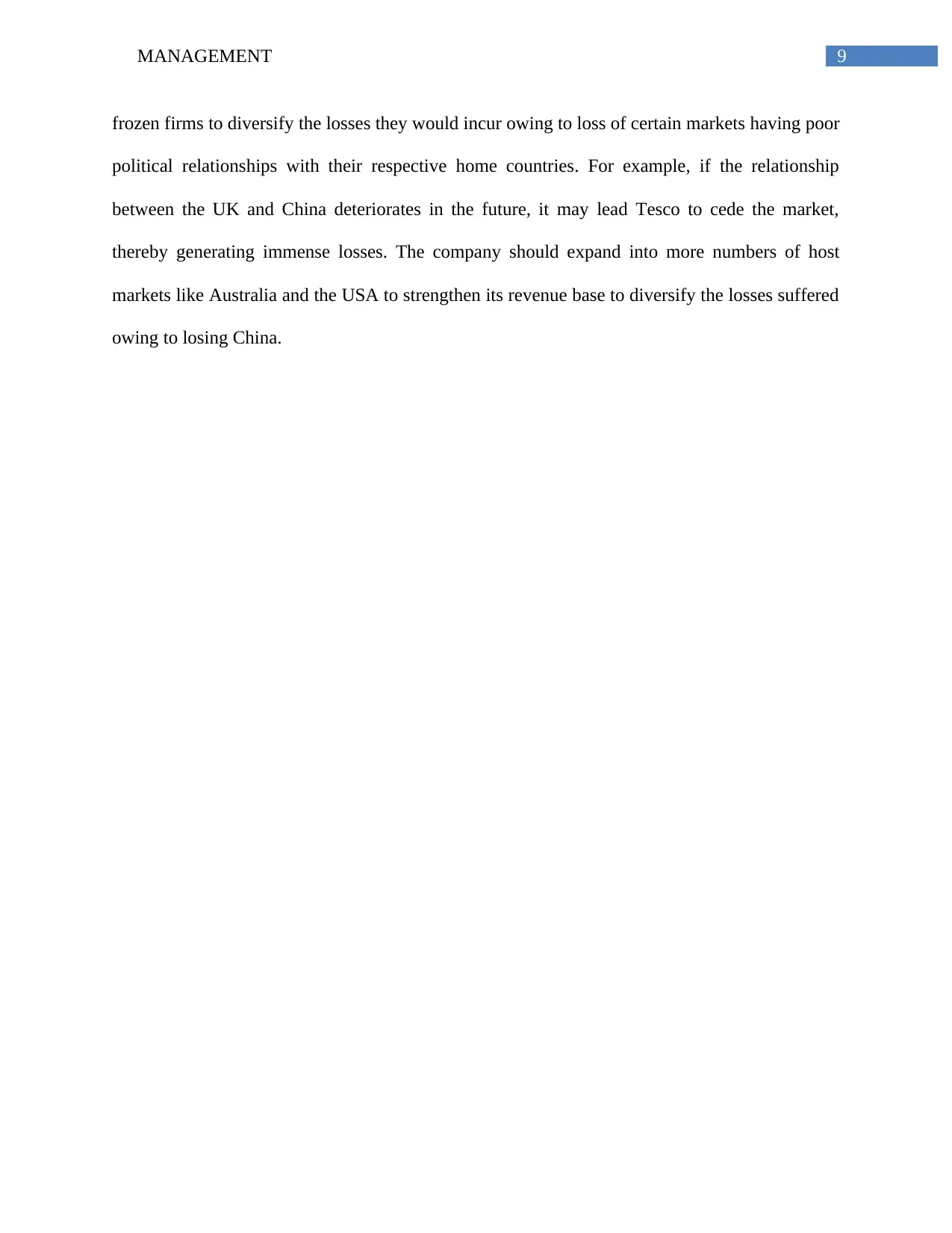
9MANAGEMENT
frozen firms to diversify the losses they would incur owing to loss of certain markets having poor
political relationships with their respective home countries. For example, if the relationship
between the UK and China deteriorates in the future, it may lead Tesco to cede the market,
thereby generating immense losses. The company should expand into more numbers of host
markets like Australia and the USA to strengthen its revenue base to diversify the losses suffered
owing to losing China.
frozen firms to diversify the losses they would incur owing to loss of certain markets having poor
political relationships with their respective home countries. For example, if the relationship
between the UK and China deteriorates in the future, it may lead Tesco to cede the market,
thereby generating immense losses. The company should expand into more numbers of host
markets like Australia and the USA to strengthen its revenue base to diversify the losses suffered
owing to losing China.
Paraphrase This Document
Need a fresh take? Get an instant paraphrase of this document with our AI Paraphraser
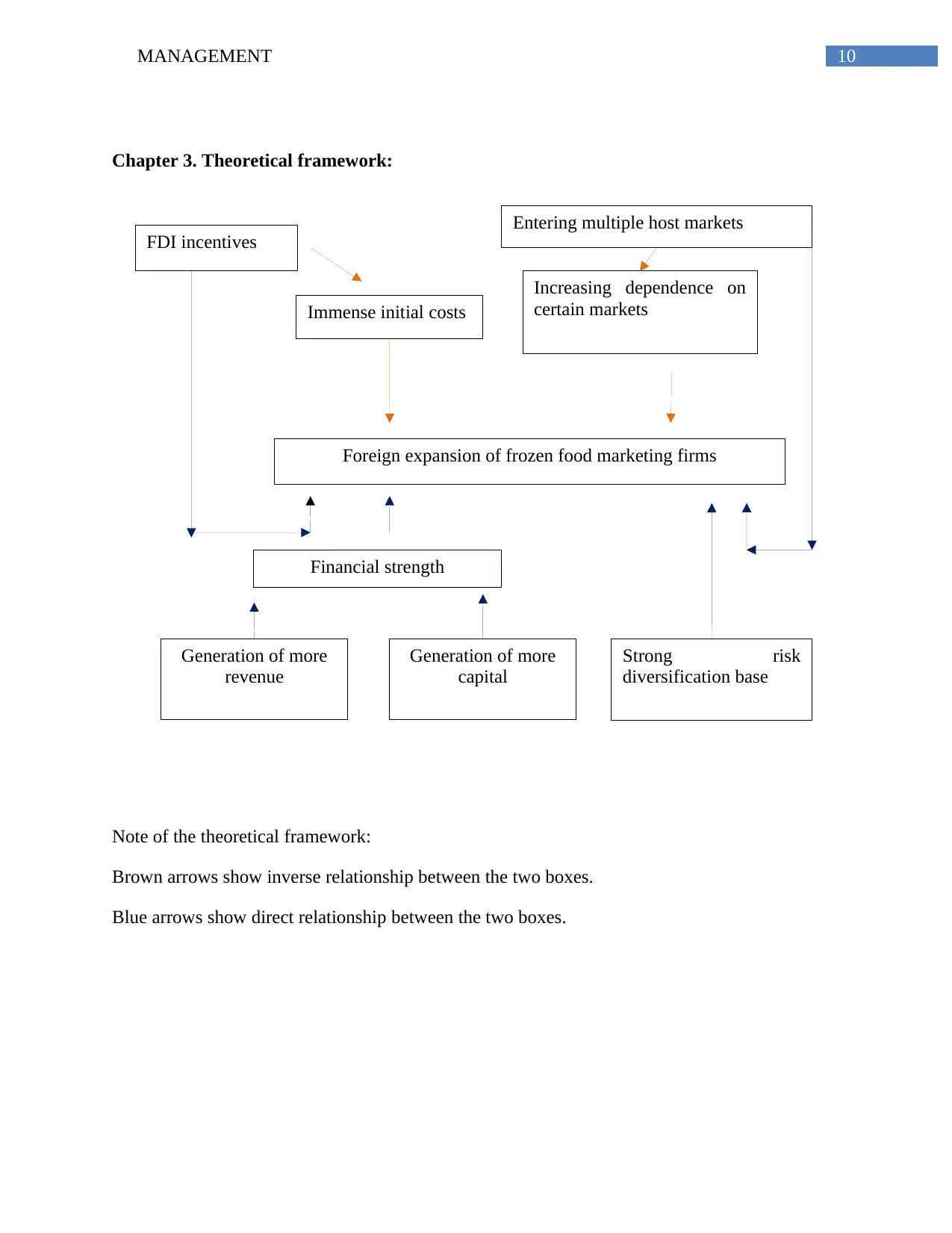
10MANAGEMENT
Foreign expansion of frozen food marketing firms
Generation of more
revenue
Generation of more
capital
Financial strength
Strong risk
diversification base
Immense initial costs
FDI incentives
Increasing dependence on
certain markets
Entering multiple host markets
Chapter 3. Theoretical framework:
Note of the theoretical framework:
Brown arrows show inverse relationship between the two boxes.
Blue arrows show direct relationship between the two boxes.
Foreign expansion of frozen food marketing firms
Generation of more
revenue
Generation of more
capital
Financial strength
Strong risk
diversification base
Immense initial costs
FDI incentives
Increasing dependence on
certain markets
Entering multiple host markets
Chapter 3. Theoretical framework:
Note of the theoretical framework:
Brown arrows show inverse relationship between the two boxes.
Blue arrows show direct relationship between the two boxes.
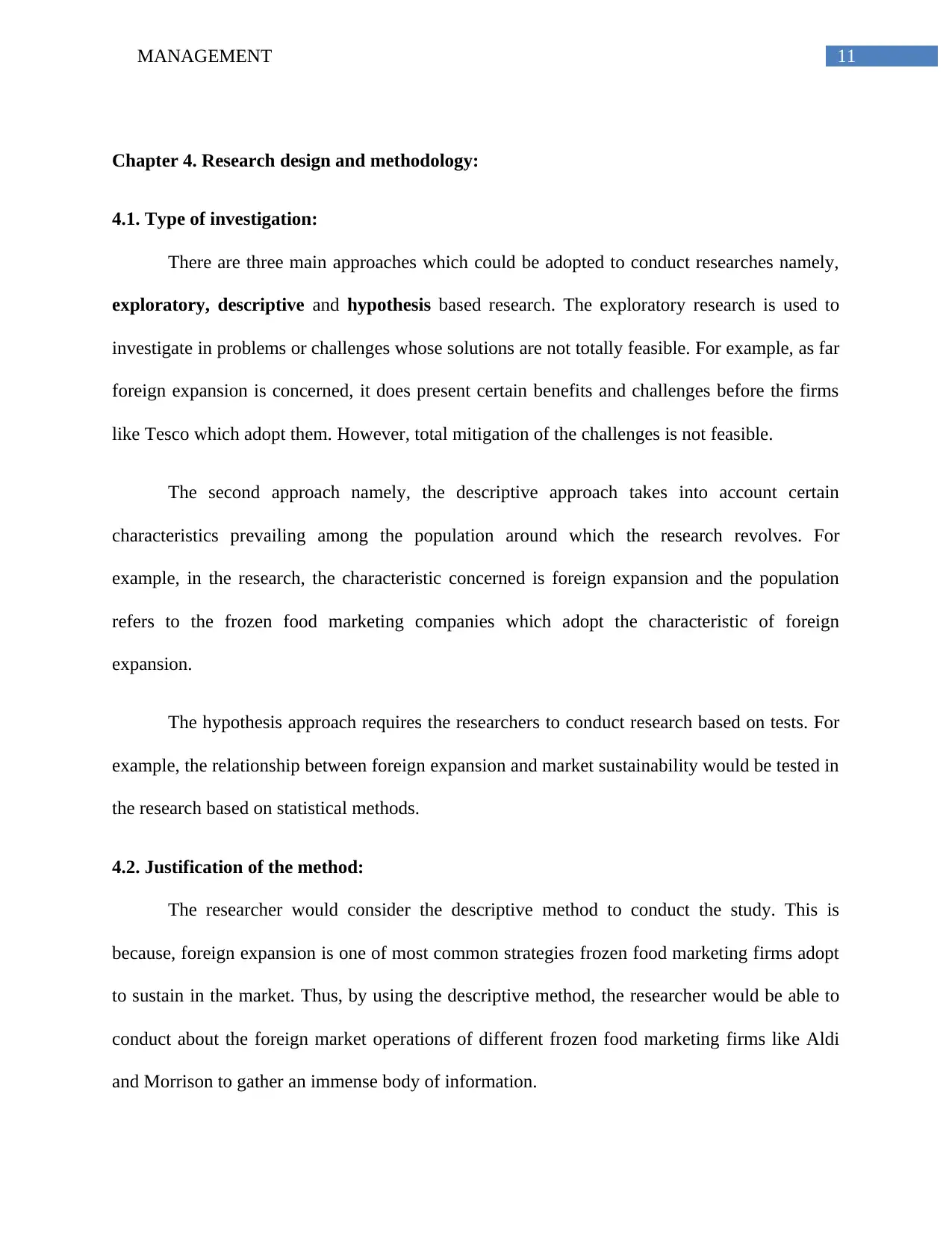
11MANAGEMENT
Chapter 4. Research design and methodology:
4.1. Type of investigation:
There are three main approaches which could be adopted to conduct researches namely,
exploratory, descriptive and hypothesis based research. The exploratory research is used to
investigate in problems or challenges whose solutions are not totally feasible. For example, as far
foreign expansion is concerned, it does present certain benefits and challenges before the firms
like Tesco which adopt them. However, total mitigation of the challenges is not feasible.
The second approach namely, the descriptive approach takes into account certain
characteristics prevailing among the population around which the research revolves. For
example, in the research, the characteristic concerned is foreign expansion and the population
refers to the frozen food marketing companies which adopt the characteristic of foreign
expansion.
The hypothesis approach requires the researchers to conduct research based on tests. For
example, the relationship between foreign expansion and market sustainability would be tested in
the research based on statistical methods.
4.2. Justification of the method:
The researcher would consider the descriptive method to conduct the study. This is
because, foreign expansion is one of most common strategies frozen food marketing firms adopt
to sustain in the market. Thus, by using the descriptive method, the researcher would be able to
conduct about the foreign market operations of different frozen food marketing firms like Aldi
and Morrison to gather an immense body of information.
Chapter 4. Research design and methodology:
4.1. Type of investigation:
There are three main approaches which could be adopted to conduct researches namely,
exploratory, descriptive and hypothesis based research. The exploratory research is used to
investigate in problems or challenges whose solutions are not totally feasible. For example, as far
foreign expansion is concerned, it does present certain benefits and challenges before the firms
like Tesco which adopt them. However, total mitigation of the challenges is not feasible.
The second approach namely, the descriptive approach takes into account certain
characteristics prevailing among the population around which the research revolves. For
example, in the research, the characteristic concerned is foreign expansion and the population
refers to the frozen food marketing companies which adopt the characteristic of foreign
expansion.
The hypothesis approach requires the researchers to conduct research based on tests. For
example, the relationship between foreign expansion and market sustainability would be tested in
the research based on statistical methods.
4.2. Justification of the method:
The researcher would consider the descriptive method to conduct the study. This is
because, foreign expansion is one of most common strategies frozen food marketing firms adopt
to sustain in the market. Thus, by using the descriptive method, the researcher would be able to
conduct about the foreign market operations of different frozen food marketing firms like Aldi
and Morrison to gather an immense body of information.
⊘ This is a preview!⊘
Do you want full access?
Subscribe today to unlock all pages.

Trusted by 1+ million students worldwide
1 out of 16
Related Documents
Your All-in-One AI-Powered Toolkit for Academic Success.
+13062052269
info@desklib.com
Available 24*7 on WhatsApp / Email
![[object Object]](/_next/static/media/star-bottom.7253800d.svg)
Unlock your academic potential
Copyright © 2020–2026 A2Z Services. All Rights Reserved. Developed and managed by ZUCOL.




